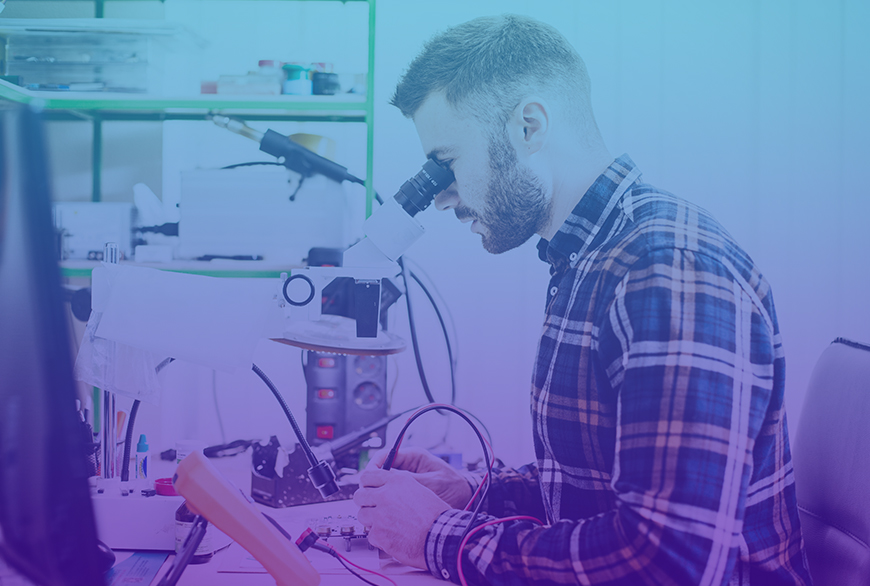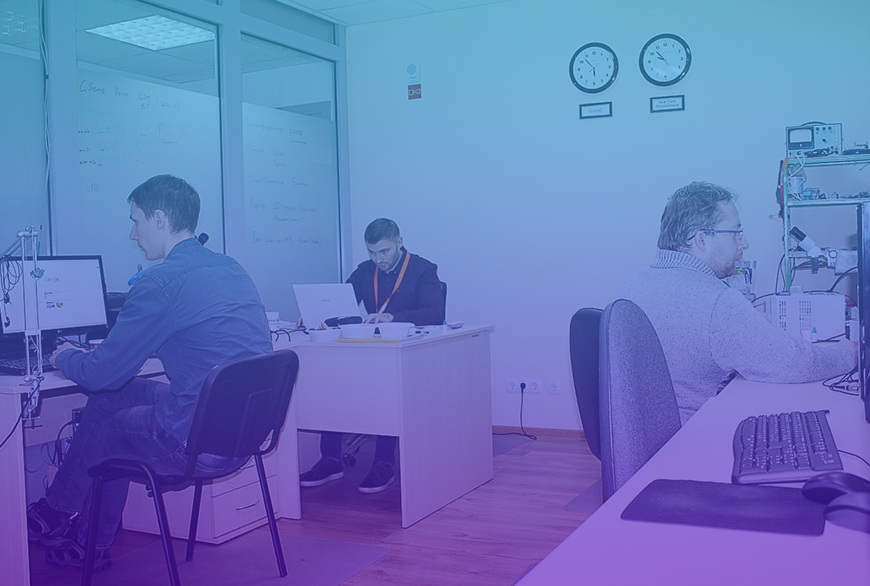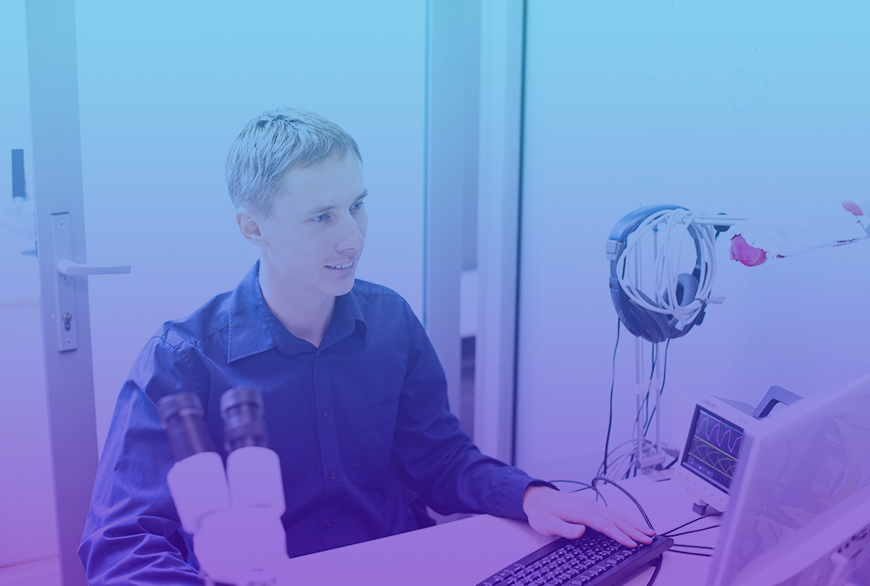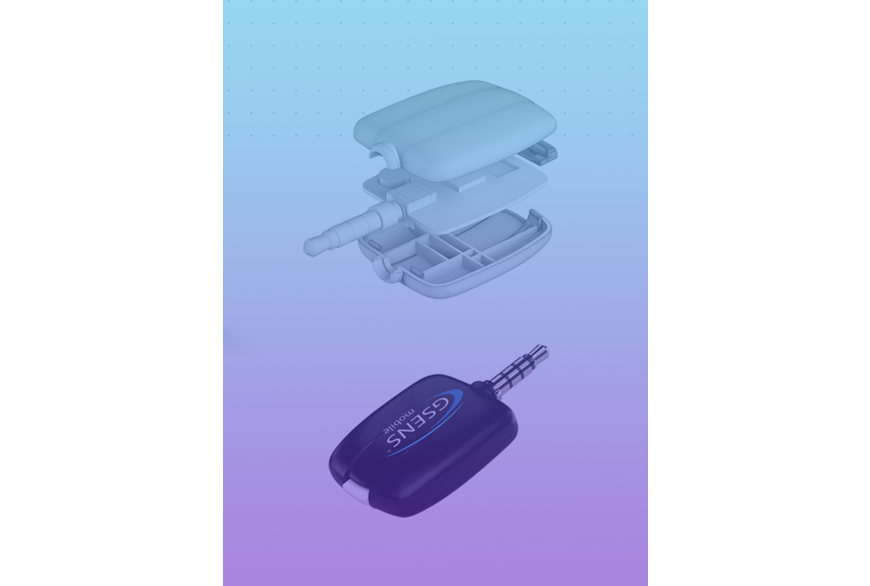On the 13th floor, at the very top of the Gomel Technopark, in office 13-03 (a pretty fearsome combination of numbers, yeah?) occupied by PieSoft hardware development team very unusual things for an IT company happen: transistors-resistors-circuits-boards – details in short – are lying all over the place. Moreover, there is a very specific odor all over the hall – that’s how the hardware smells. Plus soldering iron, flux, electrical tape, and, perhaps, technical oil. Or something else. Traditional IT-guys try to avoid this place, making their way between the staircase and the cozy lounge room in two big leaps. And on Friday evening, all these strange things get even much stranger there…
Okay, fun is fun, but the hardware development team at PieSoft is perhaps the most non-standard and therefore very mysterious company’s department. So, to get a clear idea of what the guys do there we turned directly to their team lead Yuri Shulgin.

Not every IT company can boast of having a full-fledged engineering design centre. How did PieSoft come up with the idea of creating its hardware development department and how did everything begin?
It all started, however trite it might sound, with an idea. Our customer had a need to reproduce the device – a portable blood glucose meter, an analogue of the existing one, but with enhanced capabilities. Such devices used to be very limited in terms of interaction, being able to connect only to a few, maximum five or six mobile devices (like phones or tablets). Our task was to make significant adjustments to the gadget so that it could work with a large number of mobile devices.
So, our team was set up in order to implement this idea. Firstly, it was a research hardware development team of only 2-3 people. To overcome challenges effectively, we gradually started involving subject matter specialists, methodologists and information technologists able to accomplish the tasks relevant to a specific stage of the development.
As a result, our team did a great job: we transformed the entire circuitry and modified the “stuffing” to the point where it turned out to be a completely independent and competitive device in the health care and medical supplies market. And that’s what we are especially proud of.

How big is PieSoft hardware development department? What are your technical competencies?
There are 6 of us at the moment – and each is worth his weight in gold and 100% in the right place. Since childhood we all have been amateur radio operators, enthusiasts, and inventors with impressive work experience. Sergey Serdyukov is our jack-of-all-trades, an indispensable person who can make a suitable product virtually from scrap materials. He is full of surprises! Vitaly Shevtsov is a scrupulous master of lower and upper levels software. Nether assembler nor “pluses” are challenges for him. Alexander Korolev, Alexey Titov, Vladimir Zavorotny are versatile, multi-skilled specialists. They design, model, make installation and skillfully cope with software. Besides, Alexander and Vitaly have large teaching and research experience, both are Masters of Science in engineering, have been working with students in the local university for a long time. Well, and I’m more likely a manager, an encourager who is working on the principle: do not interfere with a specialists’ work, but do your best to provide them with everything they need and keep all extraneous stuff away so they can put all their knowledge and experience into favorite occupation. Of course, I am an engineer too and nothing engineering is alien to me. In addition to all of the above, as a team lead I am always responsible for communication with customers, reporting, supply (it is especially difficult to find some commercially unavailable stuff), customs clearance and logistics.

All in all, it’s only through the team’s well-coordinated work that we manage to yield good results. And I have little to do but thank each of my team member for the great job. Guys, you are awesome! I’m pretty sure that our hardware development team will cope with most of the core tasks related to the development of electronics and specialized software with a high degree of success.
What is it like when you work in the IT development environment and don’t just code at the computer, but have to deal with… let’s say, material objects?
Well, that’s very interesting, because you produce goods that you can touch with your hands and enjoy the result of your work! You understand, that as soon as the customer receives prototypes from you, he says: “Oh, great, it’s like a factory!” (laughing). And he’s gonna be right.
How does the development usually happen in your department? Could you describe the development process from the idea to its implementation?
Any development begins with a well-written technical specification. However, being a business representative, a customer isn’t likely to deal with it properly. That’s why they usually give us the idea, while we ourselves write the technical task informative enough for an engineer. We break tasks into stages and start working. The challenge is that we do not have standard tasks, so we can’t be 100% sure how long it’ll take us to complete each stage and how many stages we will end up with. We only assume the way it should be on the basis of our experience. In the process, there may be some changes, for example, regarding extra time needed to solve a specific task or, on the contrary, we can jump over some stages.
It’s a little simpler with programmers: they have a task, for example, to write some code – and it will be written, let’s say, in a month as it was promised. There may be some bugs, testers will find them, the bugs gonna be fixed – it all takes time, but they can precisely say what they’ll get out of this in the end.
And when we were developing a blood glucose meter – it was something new. In fact, Koreans claimed it was an impossible task when our American partners had turned to them with a similar issue offering a substantial reward. But we somehow did it!

Do you often attend scientific and technical exhibitions, make reports, present your products to the public at large?
We receive invitations to the conferences pretty often, but usually there isn’t enough time to participate. However, occasionally we visit technology trade shows (e.g., ExpoElectronica in Moscow) in order to meet some prospective partner.
Do you consider yourself scientists, inventors?
First of all, our work is connected with research and development, therefore, yes, of course, the guys in our department are inventors and innovators.
Are there any bold ideas that are still in the process of reflection?
In fact, the biggest problem of the whole hardware development is the idea. You can implement almost everything. Today, a lot of things have been already invented. The electronics market is saturated right now with tons of necessary, unnecessary, slightly useful, totally useless stuff. Have a quick look at Aliexpress and you’ll feel dizzy looking through junk of all kinds offered there. Technically everything can be done, but all depends on the concept. Suppose you made something up you’ll face financing and time-management issues followed by marketing, sales, business consultancy and other things to do. At the moment there are no specific big ideas in our waiting list. And it’s great! We are open to new. I can confidently say that we will accomplish all tasks directly or indirectly related to our sphere with no trouble.
Do you plan to apply your passion, your knowledge and your skills to areas like working with gifted children?
It all comes down to free time, which is almost nonexistent. But in the long run – yes, why not? We have experience of working with student interns, some of who were pretty interesting guys that showed serious results and were rather useful team members. Technically, we are into robotics clubs, but again, the matter of free time is still decisive.
What are your plans for the future?
We would like to continue developing professionally, so that we have new non-standard tasks, and I’m sure we’ll have some. Historically speaking, the work that can be done by anyone, goes to anyone. As a rule, the projects our team gets are the most interesting and at the same time the most difficult ones, even impracticable for some specialists. But we cope with them.



